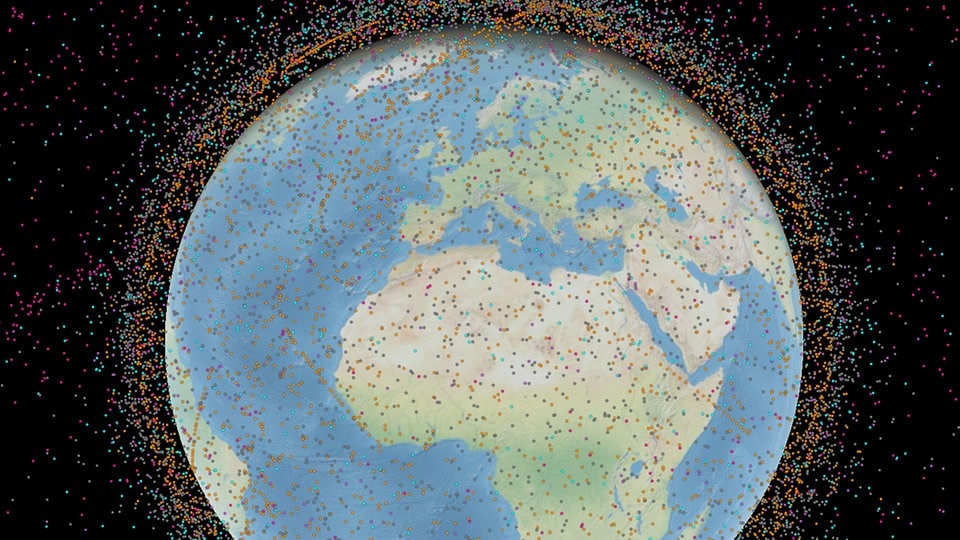More and more satellites, more and more space junk. International scientists have called for a legally binding treaty to ensure that Earth’s orbit is not irreparably polluted.
Exact numbers vary by source, but the order of magnitude is clear. According to the European Space Agency Esa, there are currently more than 7,000 active satellites in various orbits, other sources even talk about 9,000 satellites. And by 2030, according to manufacturers’ current plans, there will likely be more than 60,000.
Image credit: AstriaGraph/University of Texas
Although the universe is (probably) infinitely large, the space around the Earth at a reasonable distance from a satellite is not at all like that. Just take Low Earth Orbit (LEO) at 200 to 2,000 kilometers. Most of the satellites are buzzing here, several thousand. Then there are the satellites that have already given up the ghost, i.e. have stopped their operations, which are at least several hundred, maybe a few thousand.
Active satellite locations can be precisely located and thus controlled. They differ from inactive ones and space debris, eg rocket remnants or debris. This garbage or junk is flying uncontrollably in space and is constantly multiplying. For every time two parts collide, several new ones are created, which, however, do not lose any of their speed due to weightlessness, which increases the probability of new collisions with the same effects. Although the debris in collisions gets smaller, at a flight speed of up to 56,000 kilometers per hour, even small fragments can cause significant damage. This vicious circle of collisions in space is called the Kessler effect.
A legally binding contract is required
Many scientists who joined forces to speak more powerfully and so that policymakers might hear them are now calling for all of this to be improved. They refer to the Convention for the Protection of the World’s Oceans, which was signed recently after a long struggle.
Oceans and space, how does that fit together? This measurement is best explained by Professor Richard Thompson of the University of Plymouth, England. He was one of the first to warn about plastic pollution of the world’s oceans 20 years ago and doesn’t want to wait long again on the topic of space debris until something legally binding to protect the area is signed. “We were aware of the problem of plastic pollution a decade ago, and if we acted at that time, the amount of plastic in our oceans could be half of what it is today,” says Thompson. “In the future we need to take a more proactive stance to secure the future of our planet. We can learn a lot from the mistakes we made in our oceans, which also have a connection with the accumulation of trash in space.”
million parts
Image credit: AstriaGraph/University of Texas
Currently known and classified as space debris According to Isa About 32,000 parts are in space. That sounds like a lot, but it’s almost nothing compared to the numbers estimated from scientific model calculations. According to them, there are 36,500 pieces of junk larger than ten centimeters, plus a million small parts between one and ten centimeters, and then 130 million small pieces under a centimeter, which of course still cause damage due to their high speed. In addition, the number of satellites does not increase linearly, but rather exponentially.
There should be 60,000 by 2030, and each one has a purpose, most of it being of benefit to humanity. Therefore, scientists consider it very important not just to ensure order in space at some point in time, but now. And they realize that a number of companies and countries have already begun to look into the sustainability of satellites. But this should apply now and in the future to all countries and companies that want to use Earth’s orbit.
Incentives to take responsibility
Written agreements should state that satellite manufacturers and users take full responsibility for their equipment and any debris from the moment of launch. One could create incentives for this with money, for example.
“Humankind must take responsibility for our behavior in space now, not later,” said Melissa Quinn, director of Cornwall Spaceport. I urge all leaders to take note of this next step and recognize its importance.”
The article with the demands of scholars in the magazine Sciences Back.
view all
view all

“Total coffee aficionado. Travel buff. Music ninja. Bacon nerd. Beeraholic.”








More Stories
Coral Seeding: Artificial Insemination Makes Coral More Heat Tolerant
Fear, Anger, and Denial: How People Respond to Climate Change – Research
LKH Graz: Using radiation to combat heart arrhythmias